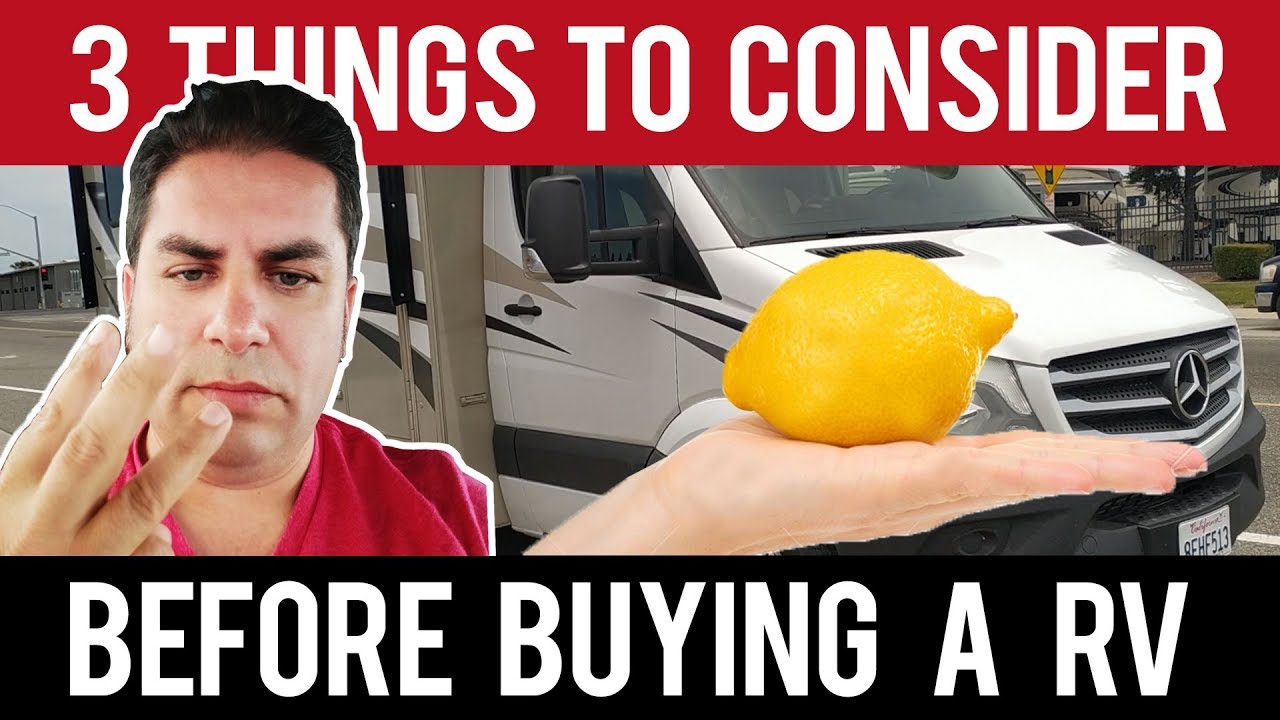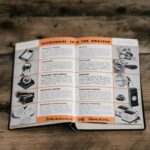If you’re in the market for an RV, you don’t want to end up with a lemon. In this video, RANDOMFIX will share 3 valuable tips to help you avoid getting stuck with a Lemon RV. From what RV dealers don’t want you to know to what to look for when buying a lemon RV, this video has got you covered. Don’t waste time and money returning your lemon RV back to the dealership – watch this video to make a smart and informed decision.
With helpful advice and insights, you’ll learn how to spot red flags and make the best choice when purchasing a recreational vehicle. Whether you’re a seasoned RV owner or a newbie in the market, these tips will help you navigate the RV buying process with ease and confidence. Say goodbye to the stress of dealing with a lemon RV and hello to a smooth and enjoyable journey on the road.
Understanding Lemon RVs
When it comes to purchasing an RV, the last thing you want is to end up with a Lemon RV. Lemon RVs are recreational vehicles that have substantial defects impairing their use, safety, or value. These defects are persistent and cannot be easily fixed, despite multiple repair attempts. This article will guide you on how to understand Lemon RVs, potential issues you may face, and provide tips on avoiding getting stuck with one.
Definition of a Lemon RV
A Lemon RV is typically defined as a recreational vehicle that has recurring issues that affect its function, safety, or value. These issues are usually substantial and cannot be resolved easily. Lemon laws vary by state, but generally, they protect consumers who have bought a defective vehicle that cannot be adequately fixed, even after multiple repair attempts by the manufacturer or dealership.
Potential Issues with Lemon RVs
Some common issues you may encounter with Lemon RVs include electrical problems, water damage, faulty appliances, structural defects, and more. These issues can not only be frustrating but also pose safety concerns for you and your passengers. Identifying and addressing these problems early on can save you time, money, and hassle in the long run.
Researching RV Models
Before purchasing an RV, it’s crucial to research different RV brands and models to find one that suits your needs and preferences. Comparing various brands will give you insights into their quality, reliability, and customer satisfaction. Reading reviews from current or previous owners can also provide valuable information about the RV’s performance and any common issues to look out for.
Compare Different RV Brands
Take the time to research and compare different RV brands to determine which one aligns best with your requirements. Look into factors such as build quality, features, warranty coverage, and customer service reputation. Some brands may have a better track record of producing reliable vehicles than others, so it’s essential to do your due diligence before making a purchase.
Read Reviews from Owners
Reading reviews from other RV owners can offer unique perspectives and insights into the real-life experiences of owning a particular RV model. Pay attention to both positive and negative reviews to get a comprehensive understanding of the vehicle’s strengths and weaknesses. This information can help you make an informed decision and potentially avoid buying a Lemon RV.

Inspecting the RV
Once you’ve narrowed down your choices and found an RV that interests you, it’s time to inspect the vehicle thoroughly. Checking for water damage, testing appliances and systems, and examining the overall condition of the RV can help you uncover any potential issues before making a purchase.
Check for Water Damage
Water damage is a common problem in RVs and can lead to costly repairs if not addressed promptly. Inspect the interior and exterior of the RV for any signs of water leaks, stains, or warping. Pay close attention to areas around windows, doors, and the roof, as these are common entry points for water intrusion.
Test Appliances and Systems
Ensure that all appliances and systems in the RV are in proper working order. Test the refrigerator, stove, microwave, air conditioning, heating, plumbing, and electrical systems to make sure everything functions as expected. Any abnormalities or malfunctions should be addressed before finalizing the purchase.
Professional Inspection
While conducting a personal inspection is essential, hiring a professional RV inspector can provide you with a more comprehensive assessment of the vehicle’s condition. A professional inspector will have the expertise to identify hidden issues that may not be apparent to the untrained eye.
Hire an RV Inspector
Consider hiring a certified RV inspector to perform a detailed examination of the RV. A professional inspector will assess the vehicle’s mechanical components, structural integrity, and overall condition. Their insights can help you make an informed decision about whether the RV is worth purchasing or if there are significant concerns that need to be addressed.
Request Maintenance Records
Ask the seller for maintenance records and service history to get a better understanding of how the RV has been cared for over time. Regular maintenance and timely repairs indicate that the RV has been well-maintained and likely has fewer underlying issues. Reviewing these records can give you peace of mind when making a purchasing decision.

Understanding Lemon Laws
Lemon laws are consumer protection laws designed to provide remedies for buyers of defective products, including vehicles like RVs. Understanding your rights as a consumer and how Lemon Laws protect RV buyers can help you navigate potential issues with a Lemon RV more effectively.
Know Your Rights as a Consumer
Before purchasing an RV, familiarize yourself with your consumer rights under Lemon Laws. These laws typically outline the criteria for a vehicle to be classified as a Lemon and the legal steps you can take to seek recourse if you believe you have been sold a defective RV. Being aware of your rights can empower you to take action if needed.
How Lemon Laws Protect RV Buyers
Lemon laws vary by state, but they generally provide remedies such as a refund, replacement, or vehicle buyback if the RV is determined to be a Lemon. These laws aim to hold manufacturers and dealers accountable for selling defective products and ensure that consumers are not stuck with unusable or unsafe vehicles. Knowing how Lemon Laws protect you can give you confidence when dealing with potential Lemon RV issues.
Negotiating with Dealerships
When purchasing an RV from a dealership, it’s essential to be prepared for negotiations. Being knowledgeable about RV pricing, asking for warranty information, and understanding your rights as a buyer can help you secure a fair deal and protect yourself from potential risks.
Be Knowledgeable about RV Pricing
Researching RV prices and understanding the market value of the RV model you’re interested in can give you leverage during negotiations. Knowing what a fair price range is for the RV’s condition, age, and features can help you avoid overpaying and ensure that you’re getting a reasonable deal.
Ask for Warranty Information
Inquire about the warranty coverage offered by the dealership or manufacturer for the RV you’re considering. Understanding the warranty terms, coverage limits, and duration can protect you from unexpected repair costs in the future. If possible, negotiate for extended warranty options to provide additional peace of mind.

Taking a Test Drive
Before finalizing the purchase of an RV, it’s crucial to take a test drive to assess the vehicle’s performance, handling, and overall condition. Testing the engine performance, brakes, steering, and overall drivability can help you identify any issues that may impact your driving experience.
Check Engine Performance
During the test drive, pay attention to the engine’s performance, including acceleration, smoothness, and responsiveness. Listen for any unusual noises, vibrations, or warning lights that may indicate underlying mechanical issues. A well-maintained engine should operate smoothly and provide consistent power output.
Test Brakes and Steering
Test the brakes and steering system to ensure that they are responsive and function properly. Brakes should engage smoothly without pulsating or making strange noises, while the steering should be precise and not exhibit any excessive play or resistance. Any abnormalities in these systems should be addressed before finalizing the purchase.
Documenting Issues
In the event that you encounter any problems or defects with the RV, it’s essential to document them thoroughly. Keeping a record of issues, taking photos or videos of defects, and maintaining communication with the seller or dealership can help you seek resolution and protect your rights as a buyer.
Keep a Record of Problems
Create a detailed log of any issues or malfunctions you notice with the RV, including dates, descriptions, and any attempted repairs. Keeping a record of problems can help you track recurring issues, demonstrate the severity of the defects, and support your case if you need to seek recourse under Lemon Laws.
Take Photos or Videos of Defects
Documenting defects visually through photos or videos can provide compelling evidence of the RV’s condition and any visible issues. Capture multiple angles, close-up shots, and videos demonstrating the problems to supplement your written documentation. These visuals can strengthen your case and help you communicate effectively with the seller or legal experts.

Consulting with Legal Experts
If you find yourself dealing with a Lemon RV and facing challenges with the seller or dealership, seeking legal advice may be necessary. Consulting with legal experts who specialize in Lemon Law cases can help you understand your legal options, navigate dispute resolution processes, and advocate for your rights as a consumer.
Seek Legal Advice if Necessary
If you believe you have purchased a Lemon RV and are struggling to resolve the issues with the seller or manufacturer, it’s crucial to seek legal advice promptly. A Lemon Law attorney can review your situation, assess the strength of your case, and guide you through the legal process of seeking compensation or recourse under consumer protection laws.
Understand Dispute Resolution Options
Legal experts can help you explore various dispute resolution options, including negotiation, mediation, arbitration, or litigation. Understanding the pros and cons of each approach and how they align with your goals can empower you to make informed decisions about how to address Lemon RV issues effectively. Legal representation can provide you with the advocacy and support needed to protect your rights and interests.
Conclusion
By following the tips outlined in this article, you can minimize the risk of purchasing a Lemon RV and enjoy your recreational vehicle with peace of mind. From researching RV models and inspecting the vehicle to negotiating with dealerships and documenting issues, taking proactive steps can help you make an informed decision and protect yourself from potential Lemon RV pitfalls. Remember to stay informed, assert your consumer rights, and seek help from legal experts if needed to navigate any challenges that may arise. Happy RVing!





